Potts Surname Ancestry ResultsOur indexes 1000-1999 include entries for the spelling 'potts'. In the period you have requested, we have the following 1192 records (displaying 561 to 570): Single Surname Subscription | | | Buying all 1,192 results of this search individually would cost £6,992.00. But you can have free access to all 1,192 records for a year, to view, to save and print, for £100. Save £6,892.00. More... |
These sample scans are from the original record. You will get scans of the full pages or articles where the surname you searched for has been found. Your web browser may prevent the sample windows from opening; in this case please change your browser settings to allow pop-up windows from this site. Officers of the British Army
(1832)
The annual Army List, published By Authority, first lists officers of the rank of major and above, by rank, and with dates of appointment to each successive higher rank; holders of crosses, crosses with clasps (with number of clasps indicated), medals, medals with clasps (with number of clasps indicated) are marked as such; and an ornate W indicates those officers actually present in any of the actions of 16, 17 or 18 June 1815 and therefore awarded the Waterloo Medal. For each officer in this section, the final column notes his then present or immediately former regiment and/or office, if any. Next, all the officers of the army are listed, down to the rank of ensign, by regiment or corps, giving rank, name, date of rank in the regiment, and date of rank in the army, with occasional further notes. Again, holders of medals are duly noted, as in the first list. For each regiment the paymaster, adjutant, quartermaster, surgeon and assistant surgeons are named, as well as the civilian agent; and the regimental motto, battle honours, and colours of the facings and lace of the dress uniform are stated. After the British regiments of the line, the officers of the West India infantry, the Ceylon rifles, the Royal African Colonial Corps, the Cape Mounted Riflemen, the Royal Newfoundland Veterans, and the Royal Malta Fencibles are given; then the officers of the garrisons and other military establishments in Great Britain, Ireland, North America and Gibraltar (with Malta); the Royal Artillery; Commissariat Department; Medical Department; Chaplains' Department; officers retained on full pay; officers on British half pay; and officers on Foreign half pay (including the German Legion, the Brunswick Cavalry, the Brunswick Infantry, Chasseurs Brittaniques, Corsican Rangers, Dillon's Regiment, the Greek Light Infantry, Malta Regiment, Meuron's Regiment, Roll's Regiment, Sicilian Regiment, Watteville's Regiment, and the York Light Infantry Volunteers).POTTS. Cost: £4.00.  | Sample scan, click to enlarge
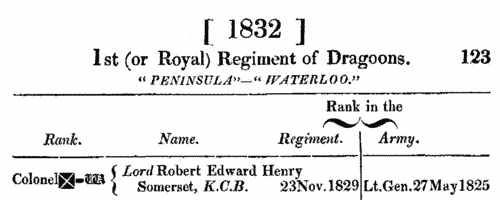
| Prisoners at Maidstone
(1832)
The return from the County Gaol and House of Correction at Maidstone from 1 January to 31 December 1832 lists all prisoners (full name), place from whence committed, number of days detained in the year (before final commitment; after final commitment; and after conviction), and sentence, giving time of imprisonment (if any), or whether acquitted, discharged, executed, transported, whipped, or died in gaol.POTTS. Cost: £6.00.  | Sample scan, click to enlarge

| South County Durham Poll Book: Barnard Castle District
(1832)
A poll for two Knights of the Shire to represent in Parliament the Southern Division of the county palatine of Durham was taken on 21 and 22 December 1832. This poll book sets out all the electors by polling district (Barnard Castle, Bishop Auckland, Darlington, Middleton-in-Teesdale, Sedgefield, Stanhope and Stockton) and gives registered number; full name (surname first); place of abode; nature of qualification (such as House as occupier, Land as occupier, Copyhold Property, &c.); and the name of the parish, township or place where the property is situate. The votes are set out in the right-hand columns, under P. (for Joseph Pearse, jun., esq.), B. (John Bowes, esq.), and S. (Robert Duncombe Shafto, esq.), the three candidates. A voter could choose two candidates, in which case a dash is put in each of the two appropriate columns, or plump for just one - where a star is placed in that candidate's column. This was the first election after the Reform Act, which extended the franchise in the counties to all adult men possessing freehold worth 40s a year or more, or copyhold or long leasehold of £10 or more, or being tenants or short leaseholders of £50 or more. POTTS. Cost: £4.00.  | Sample scan, click to enlarge

| South County Durham Poll Book: Darlington District
(1832)
A poll for two Knights of the Shire to represent in Parliament the Southern Division of the county palatine of Durham was taken on 21 and 22 December 1832. This poll book sets out all the electors by polling district (Barnard Castle, Bishop Auckland, Darlington, Middleton-in-Teesdale, Sedgefield, Stanhope and Stockton) and gives registered number; full name (surname first); place of abode; nature of qualification (such as House as occupier, Land as occupier, Copyhold Property, &c.); and the name of the parish, township or place where the property is situate. The votes are set out in the right-hand columns, under P. (for Joseph Pearse, jun., esq.), B. (John Bowes, esq.), and S. (Robert Duncombe Shafto, esq.), the three candidates. A voter could choose two candidates, in which case a dash is put in each of the two appropriate columns, or plump for just one - where a star is placed in that candidate's column. This was the first election after the Reform Act, which extended the franchise in the counties to all adult men possessing freehold worth 40s a year or more, or copyhold or long leasehold of £10 or more, or being tenants or short leaseholders of £50 or more. POTTS. Cost: £4.00.  | Sample scan, click to enlarge

| South County Durham Poll Book: Sedgefield District
(1832)
A poll for two Knights of the Shire to represent in Parliament the Southern Division of the county palatine of Durham was taken on 21 and 22 December 1832. This poll book sets out all the electors by polling district (Barnard Castle, Bishop Auckland, Darlington, Middleton-in-Teesdale, Sedgefield, Stanhope and Stockton) and gives registered number; full name (surname first); place of abode; nature of qualification (such as House as occupier, Land as occupier, Copyhold Property, &c.); and the name of the parish, township or place where the property is situate. The votes are set out in the right-hand columns, under P. (for Joseph Pearse, jun., esq.), B. (John Bowes, esq.), and S. (Robert Duncombe Shafto, esq.), the three candidates. A voter could choose two candidates, in which case a dash is put in each of the two appropriate columns, or plump for just one - where a star is placed in that candidate's column. This was the first election after the Reform Act, which extended the franchise in the counties to all adult men possessing freehold worth 40s a year or more, or copyhold or long leasehold of £10 or more, or being tenants or short leaseholders of £50 or more. POTTS. Cost: £4.00.  | Sample scan, click to enlarge

| South County Durham Poll Book: Stockton District
(1832)
A poll for two Knights of the Shire to represent in Parliament the Southern Division of the county palatine of Durham was taken on 21 and 22 December 1832. This poll book sets out all the electors by polling district (Barnard Castle, Bishop Auckland, Darlington, Middleton-in-Teesdale, Sedgefield, Stanhope and Stockton) and gives registered number; full name (surname first); place of abode; nature of qualification (such as House as occupier, Land as occupier, Copyhold Property, &c.); and the name of the parish, township or place where the property is situate. The votes are set out in the right-hand columns, under P. (for Joseph Pearse, jun., esq.), B. (John Bowes, esq.), and S. (Robert Duncombe Shafto, esq.), the three candidates. A voter could choose two candidates, in which case a dash is put in each of the two appropriate columns, or plump for just one - where a star is placed in that candidate's column. This was the first election after the Reform Act, which extended the franchise in the counties to all adult men possessing freehold worth 40s a year or more, or copyhold or long leasehold of £10 or more, or being tenants or short leaseholders of £50 or more. POTTS. Cost: £4.00.  | Sample scan, click to enlarge

| Masters of British Merchantmen
(1834)
Lloyd's Register of British and Foreign Shipping was established in 1834, following the demise of two earlier societies for registering shipping in Britain. The new register in 1834 was created from an alphabetical list of British ships with no more detail than name, master's name, tonnage, and port to which they belonged. Lloyd's insurance syndicate provided £1000 for the establishment of a new system of surveyors, and as the year progressed many of the entries in the register were then annotated with additional information - type of vessel (Bk, barque; Bg, brig; Cr, cutter; Dr, dogger; G, galliott; H, hoy; K, ketch; Lr, lugger; S, ship; Sk, smack; Sp, sloop; Sr, schooner; St, schoot; Sw, snow; Yt, yacht), place and year of build, owners, destined voyage, and classification of the vessel and its stores, with the month (indicated by the final number in the last column) of inspection. Underneath each of these amended entries details were given of construction and repair, with year - s., sheathed; d., doubled; C., coppered; I. B., iron bolts; s. M., sheathed with marine metal; s. Y. M., sheathed with yellow metal; F., felt; PH., patent hair; Cl., clincher; len., lengthened; lrp., large repairs; trp., thorough repairs; ND., new deck; M. TSds., new top-sides; W. C., wales cased; NW., new wales; Srprs, some repairs - and, in italics, the timber of the ship is described - B. B., black birch; Bh, beech; C., cedar; E., elm; F., fir; G., gum; Ght., greenheart; Hk., hackmatack; L., locust; L. O., live oak; P., pine; P. P., pitch pine; R. P., red pine; Y. P., yellow pine; S., spruce; T., teak; W. O., white oak. The sample scan is from the main list. The third column, reserved for masters' names, is not particularly wide; with short surnames, an initial will be given; but longer surnames omit the initials, and even longer surnames are abbreviated. This is the index to masters in the main list. Often new masters had been appointed by the time of survey, and their names are added in slightly smaller type under the original master's names in the third column. These new masters are also included in this index.POTTS. Cost: £6.00.  | Sample scan, click to enlarge
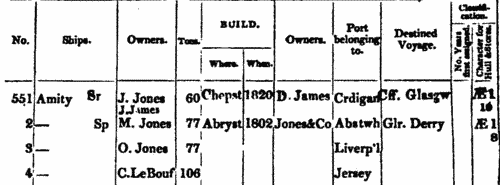
| Merchants, Bankers, Shipowners and Traders of London
(1834)
The public prints of December 1834 carried this loyal address to king William IV of merchants, bankers, shipowners, traders and others connected with the city of London, requesting 'permission at the present juncture to address your Majesty for the purpose of renewing the expression of our dutiful and loyal attachment to your Majesty’s person and crown. Deeply sensible of the practical blessings we have hitherto enjoyed under our wisely mixed constitution of King, Lords, and Commons, and feeling that the free and legitimate exercise of the Royal prerogative forms an integral part of that constitution (as essential to the maintenance of our own liberties as to the power and dignity of the Throne), we beg humbly to assure your Majesty of our determination steadfastly to uphold the same by every means in our power.
'Feeling, in common with all classes of your Majesty’s subjects, the deep importance of applying to all real abuses, wherever they may be found, a wholesome and timely correction, and of effecting in our excellent institutions every improvement of which careful examination and experience may prove them to be susceptible, we desire further dutifully to express our entire confidence that these useful purposes will ever occupy your Majesty’s paternal care. Nor can we permit ourselves to believe that the importance of these objects will be less apparent to those to whom the powers of government have been recently intrusted.'
Full names are given (or surname with initials), and address. Over 5000 subscribed.
POTTS. Cost: £6.00.  | Sample scan, click to enlarge
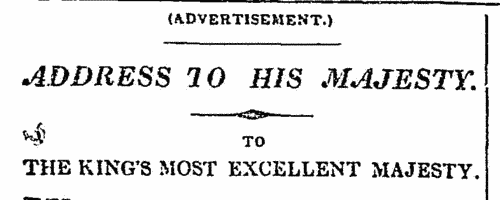
| Owners of British Merchantmen
(1834)
Lloyd's Register of British and Foreign Shipping was established in 1834, following the demise of two earlier societies for registering shipping in Britain. The new register in 1834 was created from an alphabetical list of British ships with no more detail than name, master's name, tonnage, and port to which they belonged. Lloyd's insurance syndicate provided £1000 for the establishment of a new system of surveyors, and as the year progressed many of the entries in the register were then annotated with additional information - type of vessel (Bk, barque; Bg, brig; Cr, cutter; Dr, dogger; G, galliott; H, hoy; K, ketch; Lr, lugger; S, ship; Sk, smack; Sp, sloop; Sr, schooner; St, schoot; Sw, snow; Yt, yacht), place and year of build, owners, destined voyage, and classification of the vessel and its stores, with the month (indicated by the final number in the last column) of inspection. Underneath each of these amended entries details were given of construction and repair, with year - s., sheathed; d., doubled; C., coppered; I. B., iron bolts; s. M., sheathed with marine metal; s. Y. M., sheathed with yellow metal; F., felt; PH., patent hair; Cl., clincher; len., lengthened; lrp., large repairs; trp., thorough repairs; ND., new deck; M. TSds., new top-sides; W. C., wales cased; NW., new wales; Srprs, some repairs - and, in italics, the timber of the ship is described - B. B., black birch; Bh, beech; C., cedar; E., elm; F., fir; G., gum; Ght., greenheart; Hk., hackmatack; L., locust; L. O., live oak; P., pine; P. P., pitch pine; R. P., red pine; Y. P., yellow pine; S., spruce; T., teak; W. O., white oak. The sample scan is from the main list. The seventh column, reserved for owners' names, is not particularly wide; with short surnames, an initial will be given; but longer surnames omit the initials, and even longer surnames are abbreviated. This is the index to owners in the main list.POTTS. Cost: £6.00.  | Sample scan, click to enlarge
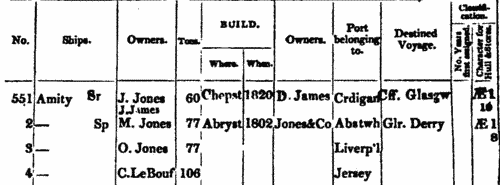
| Minor offenders in South Shields, county Durham
(1834-1835)
Justices of the Peace throughout England and Wales had the power of summary conviction for certain minor offences, principally vagrancy, poaching, petty theft, bastardy and assault. The magistrates' clerks for each district were required by Parliament to make a return of the names, offences, terms of imprisonment, and whether a written record was made of the proceedings, for the period from Michaelmas (29 September) 1834 to Michaelmas 1835. The return vary in completeness from magistrate to magistrate - the fullest returns also give the offender's address, the amount of fine or length of imprisonment, and/or the names of the justices. POTTS. Cost: £6.00.  | Sample scan, click to enlarge
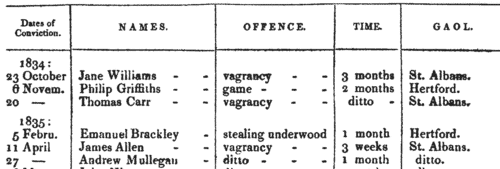
|
Research your ancestry, family history, genealogy and one-name study by direct access to original records and archives indexed by surname.
|












